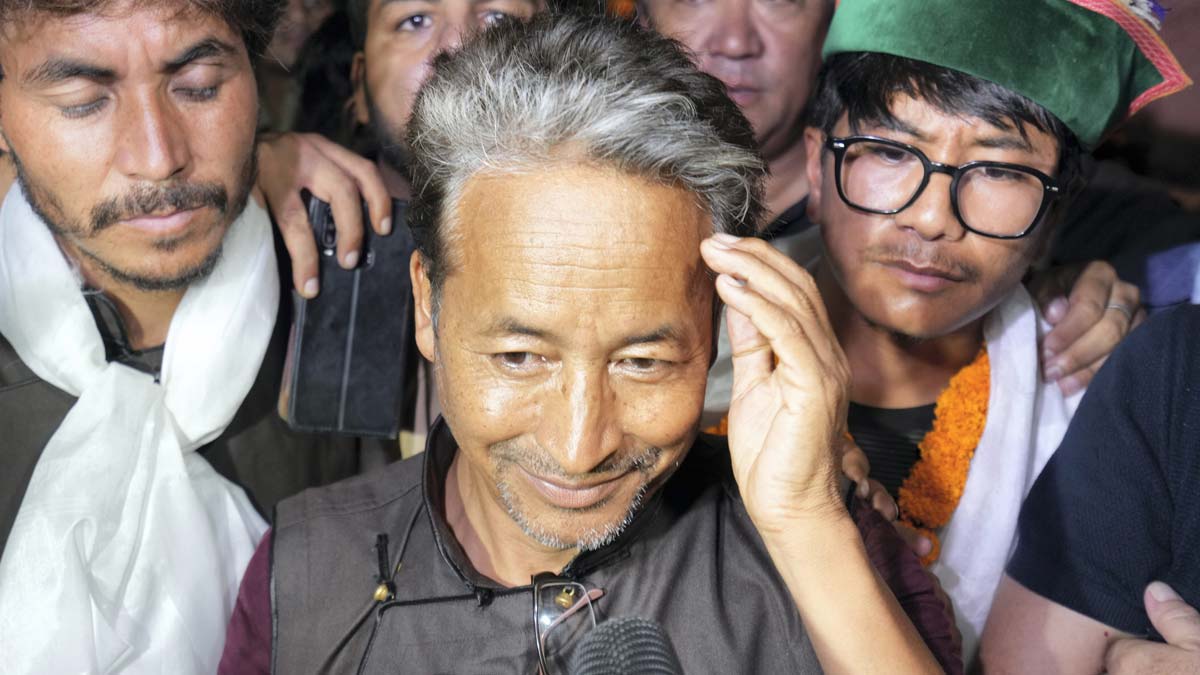After being freed from police detention, climate activist Sonam Wangchuk said that he and his fellow 'padayatris' will meet Prime Minister Narendra Modi or President Droupadi Murmu in the coming days to reiterate their demands to protect Ladakh.
Wangchuk has been demanding constitutional safeguards for the Union Territory, along with measures to protect Ladakh's ecologically fragile ecosystem from industrial and mining interests. He had sat on a hunger strike in March to demand statehood and Sixth Schedule status for Ladakh. He had followed it up with a call for the ‘Pashmina March’ on April 7 to highlight the plight of the Changpa nomadic tribes, but was forced to call off the march after the Ladakh administration imposed Section 144 and shut down the internet.
#WATCH | Delhi | Ladakh activist Sonam Wangchuk says, "More than 150 Padyatri reached Delhi from Leh. We faced some problems when we reached Delhi due to detention. But, whatever happens, it happens for good and we are happy that our message of environmental conservation reached… https://t.co/IkCCRkBf08 pic.twitter.com/9z5g3V4fGD
— ANI (@ANI) October 2, 2024
Wangchuk then started the ‘Delhi Chalo Padyatra’ on September 1 with his supporters from Leh, leading to his detention in the national capital.
"We have demanded a democratic set-up for Ladakh, and the Sixth Schedule is also a part of it. We have been assured that we will meet top leadership, and the date of meeting will be confirmed in a couple of days," Wangchuk told mediapersons after visiting Mahatma Gandhi's memorial.
Wangchuk said they have been assured that talks with the representatives of the Leh Apex Body (LAB) and Kargil Democratic Alliance (KDA) will resume within 15 days.
The march was organised by the LAB and the KDA, which have been at the forefront of the agitation to demand statehood for Ladakh, inclusion under the Sixth Schedule of the Constitution, early recruitment process along with a public service commission for Ladakh, and separate Lok Sabha seats for Leh and Kargil districts.
Why the demand for Ladakh's inclusion under Sixth Schedule
The indigenous tribal communities constitute around 97 per cent of the population in Ladakh. In an interview with THE WEEK earlier, Wangchuk had said that the Union Territory's inclusion under the Sixth Schedule of the Constitution is vital for protecting them, as it will grant autonomy to tribal regions. "Locals should be empowered in the Himalayas because they can best preserve it," he told the media yesterday.
Though Ladakh became a Union Territory in 2019, unlike under Article 370, there are no safeguards for hilly regions, he said. The Sixth Schedule establishes Autonomous District Councils with legislative and judicial powers, which can help them regulate land, forest, water, agriculture, health, sanitation, and mining. The Sixth Schedule, Wangchuk says, ensures that development decisions are taken in consultation with indigenous communities, which is vital for the fragile ecosystem of the Himalayas. He says that in the absence of constitutional safeguards, Ladakh faces the risk of mining and exploitation of its resources.


